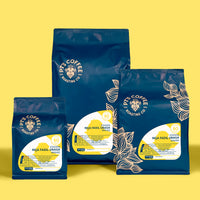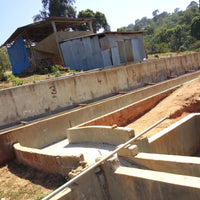Ethiopia
Neja Fadil Uraga Washed
Pear, Butterscotch, Lemongrass



Ethiopia
Neja Fadil Uraga Washed
Pear, Butterscotch, Lemongrass
A juicy and complex coffee with aromas of green grape, vanilla, and apricot. When sipped, notes of cashew, marzipan, and butterscotch are complemented by golden raisin sweetness and delicate pear-like acidity. Look for dried apricot, cardamom, and a hint of lemongrass in the finish.
Producer: Neja Fadil Wet Mill
Farm: 45 Smallholders
Region: Guji Zone
Altitude: 2,200 masl | 7,218 feet
Varietal: 74110, 74112, Dega, Wolisho
Process: Washed
Roast: Light
Notes: Pear, Butterscotch, Lemongrass
This is our third offering from Neja Fadil. We find the coffees from his mill consistently impressive!
Mr. Neja Fadil is a relative newcomer to coffee export, having built his washing station in 2017 after working for several years as a coffee collector on commission for other washing stations. The Neja Fadil wet mill in Tobitu Tuta Kebele has registered about 250 farmers from the surrounding villages so far. This lot, from 45 of the 250 registered farmers, is unusual amidst the Guji region—a coffee powerhouse—in that only in the past few years have residents of Tobitu Tuta Kebele begun farming coffee.
As is becoming increasingly common at private washing stations in Ethiopia, the station is expanding registration of farmer suppliers and launching agronomy training to extend quality control to the farm level.
Mr. Fadil didn't export his coffee in 2022, opting to sell to the local market to take advantage of higher local prices. This helped him to raise funds to build a new dry mill at a second drying station, which will produce exclusively natural coffees. We are delighted to offer his coffee again and look forward to future harvests.



